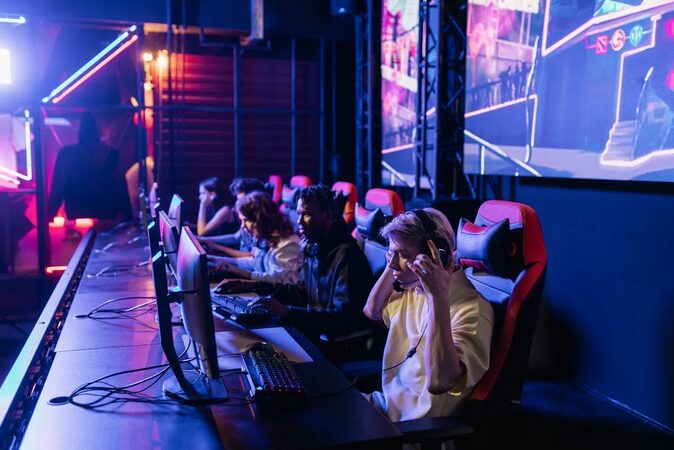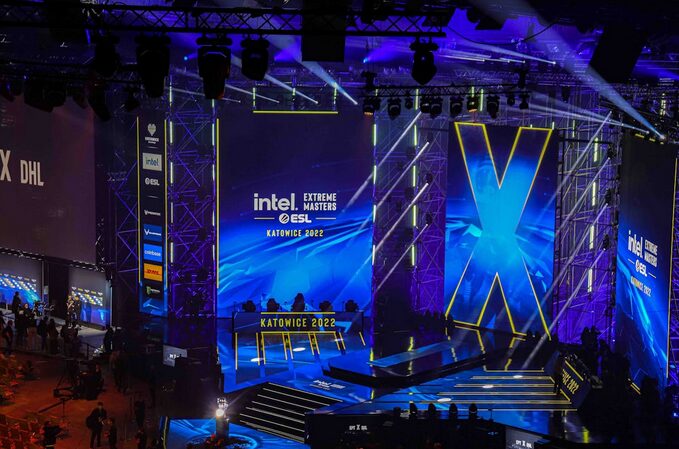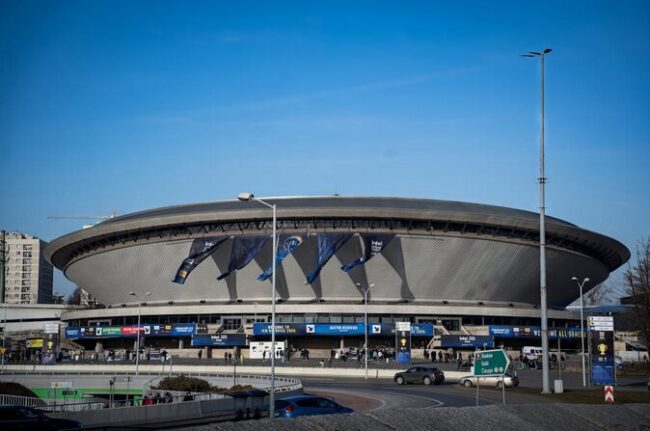The entertainment landscape is evolving at a breakneck pace. From the thrill of high-stakes esports matches to the electrifying atmosphere of live concerts, there’s never been a more exciting time for fans and performers alike. As technology advances and cultural trends shift, two giants have emerged in the realm of entertainment—esports arenas and concert halls. Each offers unique experiences that captivate audiences worldwide. But which one holds the key to the future? Will we be flocking to stadiums filled with gamers or packing into venues to see our favorite artists perform live? Let’s dive deeper into what these two forms of entertainment bring to the table.
The Experience Factor

The atmosphere in esports arenas is electric. Fans are glued to screens, their eyes wide with anticipation. Shouts erupt as players make game-changing moves. It’s a collective heartbeat, synchronized excitement. In contrast, concert halls exude a different kind of energy. Here, the air vibrates with melodies that resonate deep within. Concertgoers sway and sing along, creating an emotional tapestry woven through shared songs and moments. Lighting plays a crucial role in both spaces. Esports arenas use flashy graphics and dynamic effects to amplify the intensity of matches. Meanwhile, concert halls employ soft glows or dramatic flashes to enhance live performances. Both environments foster community but offer unique experiences tailored to their audiences’ preferences—whether it’s cheering for a favorite player or losing oneself in harmony at a live show. The choice between these two worlds often reflects one’s passion for gaming or music rather than just entertainment itself.
The Role of Technology

Technology is redefining the landscape of entertainment in remarkable ways. Virtual reality (VR) stands at the forefront, offering immersive experiences that were once unimaginable. In esports arenas, VR elevates gameplay by allowing fans to step inside their favorite games. Imagine watching a tournament from the perspective of your chosen character or interacting with players as if you’re right there on stage. This level of engagement transforms passive viewing into an active experience. Concert halls are also harnessing VR technology. Artists can create virtual concerts where fans from around the world attend without leaving their homes. Enhanced visuals and interactive elements bring performances to life like never before. As both industries embrace this innovation, audiences will find unprecedented ways to connect with content. The lines between gaming and live music might blur even further, creating a hybrid future filled with possibilities.
Impact on Traditional Entertainment

As esports arenas gain popularity, the future of traditional entertainment hangs in the balance. Concert halls have long been a staple for live music enthusiasts, offering an intimate experience with artists. However, the rise of competitive gaming has introduced a different kind of thrill. Fans flock to these venues not just for gameplay but for community and excitement. The energy is palpable as teams clash on screen. Traditional concert-goers may feel nostalgic about their favorite venues. Yet, younger audiences crave new experiences that merge technology with entertainment. This shift leaves concert halls pondering their next move.
The future of entertainment is a hot topic among experts, with predictions sparking vibrant discussions. As the world evolves, so does our appetite for diverse experiences. Experts believe there’s room for both forms of entertainment as they cater to different desires within us all. While some may prefer the energy of a packed arena filled with gamers battling it out on stage, others will still cherish the soulful strumming of a guitar echoing through an intimate venue. The landscape is shifting quickly; how these two worlds evolve together remains an open question full of potential surprises awaiting eager audiences worldwide.








 Pittsburgh, often referred to as the “Steel City,” has undergone a remarkable transformation, making it an appealing destination for real estate investments. The city’s diverse economy, fueled by technology, healthcare, and education sectors, has created a strong job market. Neighborhoods like Lawrenceville, South Side, and East Liberty have experienced significant revitalization, attracting young professionals and fostering a vibrant community. Pittsburgh’s affordability compared to other major cities, combined with its quality of life, makes it an attractive choice for both homebuyers and real estate investors looking for long-term growth potential.
Pittsburgh, often referred to as the “Steel City,” has undergone a remarkable transformation, making it an appealing destination for real estate investments. The city’s diverse economy, fueled by technology, healthcare, and education sectors, has created a strong job market. Neighborhoods like Lawrenceville, South Side, and East Liberty have experienced significant revitalization, attracting young professionals and fostering a vibrant community. Pittsburgh’s affordability compared to other major cities, combined with its quality of life, makes it an attractive choice for both homebuyers and real estate investors looking for long-term growth potential.

 The first key to overcoming the spirit of fear is recognizing that it is a normal part of life. Fear can be healthy and necessary if we use it to protect ourselves from physical or psychological harm. But too often, we let our fears become so overwhelming that they paralyze us, preventing us from taking risks and growing in faith. It’s important to remember that fear is normal, and it’s OK to feel scared sometimes.
The first key to overcoming the spirit of fear is recognizing that it is a normal part of life. Fear can be healthy and necessary if we use it to protect ourselves from physical or psychological harm. But too often, we let our fears become so overwhelming that they paralyze us, preventing us from taking risks and growing in faith. It’s important to remember that fear is normal, and it’s OK to feel scared sometimes. Another key to overcoming fear is speaking faith-filled words over our lives. We can do this by declaring scripture verses or positive affirmations about who we are in Christ and what He has promised us.
Another key to overcoming fear is speaking faith-filled words over our lives. We can do this by declaring scripture verses or positive affirmations about who we are in Christ and what He has promised us.
 The most important reason to keep up with regular maintenance on your motorcycle is for safety. When you don’t get regular service and inspections, there are a number of things that can become dangerous issues. Your bike could develop low tire pressure or flat tires, leading to blowouts or skidding. Without a proper inspection, brakes can wear down faster and make it harder to stop in time.
The most important reason to keep up with regular maintenance on your motorcycle is for safety. When you don’t get regular service and inspections, there are a number of things that can become dangerous issues. Your bike could develop low tire pressure or flat tires, leading to blowouts or skidding. Without a proper inspection, brakes can wear down faster and make it harder to stop in time. The cost of skipping regular maintenance can add up quickly. As components on your bike start to wear down faster, you’ll be spending more money on repair and replacement parts. You may also find yourself having to replace entire systems due to neglecting service calls, which can be quite costly. Not to mention the cost of extra fuel you’ll be using if your motorcycle is not running at its full efficiency.
The cost of skipping regular maintenance can add up quickly. As components on your bike start to wear down faster, you’ll be spending more money on repair and replacement parts. You may also find yourself having to replace entire systems due to neglecting service calls, which can be quite costly. Not to mention the cost of extra fuel you’ll be using if your motorcycle is not running at its full efficiency.



 Once you’ve chosen a trading style and found an excellent online platform, the next step is learning a trading strategy with risk management. Risk management is an integral part of any trading strategy and is especially important when trading online. There are many different ways to manage risk, so finding a method that works best for you is crucial. For instance, you might want to use a stop-loss order to limit your losses on each trade.
Once you’ve chosen a trading style and found an excellent online platform, the next step is learning a trading strategy with risk management. Risk management is an integral part of any trading strategy and is especially important when trading online. There are many different ways to manage risk, so finding a method that works best for you is crucial. For instance, you might want to use a stop-loss order to limit your losses on each trade.
 If you want your employees to be productive, you need to invest in the right tech for them. The tech you provide should be able to meet their needs and help them do their job better.
If you want your employees to be productive, you need to invest in the right tech for them. The tech you provide should be able to meet their needs and help them do their job better. Aside from that, it would help if you also got your employees involved with employee engagement programs. This type of software can help improve employee productivity by staying connected and engaged with their work.
Aside from that, it would help if you also got your employees involved with employee engagement programs. This type of software can help improve employee productivity by staying connected and engaged with their work.
 When you start your search for a shuttle or charter bus, it is essential to consider your needs. How many people will be riding the bus? What is the purpose of the trip? Is there a specific route that you need to take? Once you have answered these questions, you can look at each bus’s features. Some buses have more features than others, so it is essential to find one with the advanced features you need. These include comfortable seating, enough space for luggage, a restroom on board, air conditioning and heating, TV/DVD players, and many more.
When you start your search for a shuttle or charter bus, it is essential to consider your needs. How many people will be riding the bus? What is the purpose of the trip? Is there a specific route that you need to take? Once you have answered these questions, you can look at each bus’s features. Some buses have more features than others, so it is essential to find one with the advanced features you need. These include comfortable seating, enough space for luggage, a restroom on board, air conditioning and heating, TV/DVD players, and many more. When booking a shuttle or charter bus, it is essential to ask for any guarantees. It includes a refund policy if the trip is canceled and insurance in case of an accident. Ensure that you read the fine print before signing anything and understand what is included in the guarantee. The guarantee will give you peace of mind in case something goes wrong. Aside from that, it is also essential to ask about its cancellation policy. Some companies have a stringent cancellation policy, so make sure you know it before booking.
When booking a shuttle or charter bus, it is essential to ask for any guarantees. It includes a refund policy if the trip is canceled and insurance in case of an accident. Ensure that you read the fine print before signing anything and understand what is included in the guarantee. The guarantee will give you peace of mind in case something goes wrong. Aside from that, it is also essential to ask about its cancellation policy. Some companies have a stringent cancellation policy, so make sure you know it before booking.


 When you check the legal experience of a law firm, you will determine the kind of services to expect from them. Verification involves checking if the lawyer has engaged in a similar case like yours in the past. When you talk to lawyers, you will acquire adequate knowledge of their experience levels. The best firm is the one that gives you the chance to make calls to them in case you need clarifications on given issues.
When you check the legal experience of a law firm, you will determine the kind of services to expect from them. Verification involves checking if the lawyer has engaged in a similar case like yours in the past. When you talk to lawyers, you will acquire adequate knowledge of their experience levels. The best firm is the one that gives you the chance to make calls to them in case you need clarifications on given issues.  The best lawyers have quality communication skills. Lawyers take a lot of time to communicate with their opposing counsel. As a result, the judges will get the chance of presiding on a variety of their cases. Again a reputable lawyer will sacrifice their time and explain whatever is happening and update you. A variety of legal matters are hard for a common citizen to internalize. When a lawyer clarifies matters, you will be able to follow closely on whatever is happening.
The best lawyers have quality communication skills. Lawyers take a lot of time to communicate with their opposing counsel. As a result, the judges will get the chance of presiding on a variety of their cases. Again a reputable lawyer will sacrifice their time and explain whatever is happening and update you. A variety of legal matters are hard for a common citizen to internalize. When a lawyer clarifies matters, you will be able to follow closely on whatever is happening.






 There are different magic mushroom strains available in the market, and it is essential to determine the right strain that will suit your needs. Some magic mushroom strains grow indoors while others grow out in the wild. There are varying levels of strength of each strain, and then knowing the right one for you will help narrow down your search when buying.
There are different magic mushroom strains available in the market, and it is essential to determine the right strain that will suit your needs. Some magic mushroom strains grow indoors while others grow out in the wild. There are varying levels of strength of each strain, and then knowing the right one for you will help narrow down your search when buying.









 Academic studies are not just about books, pens, and laptops. Depending on the course that you’re taking, you may need to have your guitar, piano, bicycle or personal laboratory equipment in storage. In this instance, you need specialized storage facilities which may include refrigeration services for your science project specimen. Your musical instruments may, on the other hand, require individual storage boxes and storage space. Note that these storage services for students are highly flexible and trustworthy. All you need to is to contact them, and you will have the entire storage affair arranged to meet your expectations.
Academic studies are not just about books, pens, and laptops. Depending on the course that you’re taking, you may need to have your guitar, piano, bicycle or personal laboratory equipment in storage. In this instance, you need specialized storage facilities which may include refrigeration services for your science project specimen. Your musical instruments may, on the other hand, require individual storage boxes and storage space. Note that these storage services for students are highly flexible and trustworthy. All you need to is to contact them, and you will have the entire storage affair arranged to meet your expectations.

 You have probably heard this statement somewhere before that you need to get a life. Doing things that you enjoy the most is one of the ways. Of course, it will be much better if you can earn money while doing it. Traveling, teaching, writing, and cooking are some of the examples. However, do not get upset if you are still unable to achieve that position.
You have probably heard this statement somewhere before that you need to get a life. Doing things that you enjoy the most is one of the ways. Of course, it will be much better if you can earn money while doing it. Traveling, teaching, writing, and cooking are some of the examples. However, do not get upset if you are still unable to achieve that position.
 Most translators will introduce themselves with a phrase showing they are conversant in writing and speaking in the desired two languages. However, you should look into their past and their other qualifications. If they have several years, of experience in the industry you cover, or they have been in similar translating situations in the past then they are probably a good fit.
Most translators will introduce themselves with a phrase showing they are conversant in writing and speaking in the desired two languages. However, you should look into their past and their other qualifications. If they have several years, of experience in the industry you cover, or they have been in similar translating situations in the past then they are probably a good fit.

 When you settle on a classic car, you must scrutinize it. It will be helpful if you can have an expert on classic cars check it on your behalf. This is because they can see things you ordinarily wouldn’t.
When you settle on a classic car, you must scrutinize it. It will be helpful if you can have an expert on classic cars check it on your behalf. This is because they can see things you ordinarily wouldn’t.
 These are the affordable and tiny box like filters that are essential for raising small fish in hospital aquariums. That is why you need to know the type of fish you are ready to keep before you decide to purchase your fish filters. These type of filters are potent and gentle enough to maintain mild water conditions. Therefore, if you want to keep tiny fish, make sure that you consider this type of filters.
These are the affordable and tiny box like filters that are essential for raising small fish in hospital aquariums. That is why you need to know the type of fish you are ready to keep before you decide to purchase your fish filters. These type of filters are potent and gentle enough to maintain mild water conditions. Therefore, if you want to keep tiny fish, make sure that you consider this type of filters.

 home deco tools. They catch visitor’s attention and can contribute to stirring up conversations. You can take various photos for home decorations. Based on what suits you most, you can opt or individual or group photos for your living room. Additionally, you can have casual photos for the same. For other rooms such as bedrooms and study rooms, you can have either full or half pictures based on your tastes.
home deco tools. They catch visitor’s attention and can contribute to stirring up conversations. You can take various photos for home decorations. Based on what suits you most, you can opt or individual or group photos for your living room. Additionally, you can have casual photos for the same. For other rooms such as bedrooms and study rooms, you can have either full or half pictures based on your tastes. member on social sites such as Instagram, Twitter, Facebook or any other site you might need to upload photos with friends a family. Do not post blurred or dark pictures, as this will not catch the attention of your friends. As such, when posting photos on the social sites, you need to share the best shots. You can have quality pictures of hiring an expert in family photography. With good photos on your site, you are also able to catch the attention of potential recruitment agencies or head hunters.
member on social sites such as Instagram, Twitter, Facebook or any other site you might need to upload photos with friends a family. Do not post blurred or dark pictures, as this will not catch the attention of your friends. As such, when posting photos on the social sites, you need to share the best shots. You can have quality pictures of hiring an expert in family photography. With good photos on your site, you are also able to catch the attention of potential recruitment agencies or head hunters.
 increasing his visibility on the road. When a driver is raised, he or she will be able to see the road where he or she is driving towards. For instance, in case you are driving in areas that are congested, the lift kit will highly enhance your visibility. When you have the appropriate visibility of the road, you will be able to prevent the occurrence of accidents. Therefore lift kits are crucial because they will give you easy maneuvering through bumpy terrains.
increasing his visibility on the road. When a driver is raised, he or she will be able to see the road where he or she is driving towards. For instance, in case you are driving in areas that are congested, the lift kit will highly enhance your visibility. When you have the appropriate visibility of the road, you will be able to prevent the occurrence of accidents. Therefore lift kits are crucial because they will give you easy maneuvering through bumpy terrains. If you want to increase the overall performance of your ATV without much struggle, you should then install lift kits. With lift kits, you will experience effortless towing and also easy loading of heavy loads. Lift kits have the ability to give your vehicle stability and making it stronger. For instance, if you are taking part in mud racing, desert racing or long distance treks. The lift kits will ensure your car remains stable and will be able to pull these activities without any challenge.
If you want to increase the overall performance of your ATV without much struggle, you should then install lift kits. With lift kits, you will experience effortless towing and also easy loading of heavy loads. Lift kits have the ability to give your vehicle stability and making it stronger. For instance, if you are taking part in mud racing, desert racing or long distance treks. The lift kits will ensure your car remains stable and will be able to pull these activities without any challenge.

 5. Experience
5. Experience

 When it comes to substances use to get rid of parasites, there is a broad array of choices, and the market has a lot to offer to us. However, always keep in mind that not all of the pesticides have an active ingredient that can help terminate bed bugs. Thus, to avoid spending on something that will do more harm than good, it is always ideal to do your homework first. Plus, before using the pesticide, always see to it that you have already read the safety instructions on how to use it. Always keep in mind that pesticides are poisonous. Thus, when using these substances, always exercise caution.
When it comes to substances use to get rid of parasites, there is a broad array of choices, and the market has a lot to offer to us. However, always keep in mind that not all of the pesticides have an active ingredient that can help terminate bed bugs. Thus, to avoid spending on something that will do more harm than good, it is always ideal to do your homework first. Plus, before using the pesticide, always see to it that you have already read the safety instructions on how to use it. Always keep in mind that pesticides are poisonous. Thus, when using these substances, always exercise caution.
 Current ratio is an equation to evaluate the firm’s ability to pay it’s short-term debts in the given period. The equation for current ratio can be determined as total current assets divided by total current liabilities. The answer should not be less than one. If the answer is less than one, then the company is trapped in paying short-term obligations.
Current ratio is an equation to evaluate the firm’s ability to pay it’s short-term debts in the given period. The equation for current ratio can be determined as total current assets divided by total current liabilities. The answer should not be less than one. If the answer is less than one, then the company is trapped in paying short-term obligations. If you want to maintain a higher liquidity, you should receive the current assets quickly into your industry. For that, you should post certain regulations for the creditors. You should reduce the period of trade receivables. You should reduce selling goods in credit and sell in cash basis. High interest must be charged for late payments. You should stop sending goods to the customers until they pay their pending debts. This will reduce the risks of bad debts.
If you want to maintain a higher liquidity, you should receive the current assets quickly into your industry. For that, you should post certain regulations for the creditors. You should reduce the period of trade receivables. You should reduce selling goods in credit and sell in cash basis. High interest must be charged for late payments. You should stop sending goods to the customers until they pay their pending debts. This will reduce the risks of bad debts.
 Like what we have said above, the outcome of the project greatly depends on the contractor that you are going to hire. Therefore, it is essential that you look for the best company that delivers quality results when it comes to installing concrete driveways. For sure, you will see a lot of contractors out there, but you should weed them out according to their reputation, quality of work, as well as the cost of service.
Like what we have said above, the outcome of the project greatly depends on the contractor that you are going to hire. Therefore, it is essential that you look for the best company that delivers quality results when it comes to installing concrete driveways. For sure, you will see a lot of contractors out there, but you should weed them out according to their reputation, quality of work, as well as the cost of service. It may sound to you like installing a concrete driveway is an easy task, but the truth is, it is not as simple as pouring concrete. It takes a lot more than that. If the contractors are not careful, there is a huge possibility that the concrete will start cracking sooner or later. But if the job is done step by step, you can expect a good outcome. Your concrete driveway will serve you for many years, and you won’t have to worry about repairing or replacing it soon.
It may sound to you like installing a concrete driveway is an easy task, but the truth is, it is not as simple as pouring concrete. It takes a lot more than that. If the contractors are not careful, there is a huge possibility that the concrete will start cracking sooner or later. But if the job is done step by step, you can expect a good outcome. Your concrete driveway will serve you for many years, and you won’t have to worry about repairing or replacing it soon.




 Even though there are costumes made for plus-sized men or women, they are not as many or as cool as those for normal-sized individuals. If you manage to lose a couple of pounds, it will be easy for you to choose from a wide range of designer outfits that will accentuate your body structure.
Even though there are costumes made for plus-sized men or women, they are not as many or as cool as those for normal-sized individuals. If you manage to lose a couple of pounds, it will be easy for you to choose from a wide range of designer outfits that will accentuate your body structure.
 before you buy it. It was developed as part of NASA during their research. It was meant for people with sores that responded to pressure. Memory foam also responds well to temperature and can last for a couple of years. When the NASA saw it was doing well in their research, they introduced it to the general consumer market as bed mattresses. It has been used for many years by different people who have confirmed their satisfaction.
before you buy it. It was developed as part of NASA during their research. It was meant for people with sores that responded to pressure. Memory foam also responds well to temperature and can last for a couple of years. When the NASA saw it was doing well in their research, they introduced it to the general consumer market as bed mattresses. It has been used for many years by different people who have confirmed their satisfaction.
 help from, you should consult a reputable and experienced real estate agent. A realtor is aware of the scenarios and suburbs of the city and will guide you in picking the best available condo for sale.
help from, you should consult a reputable and experienced real estate agent. A realtor is aware of the scenarios and suburbs of the city and will guide you in picking the best available condo for sale.

 nted
nted
 Layoffs these days are not solely caused by low performance of employees. Most are caused by the inability of the company to retain all its employees during times of crisis. Instilling that in the minds of your clients help them realize that it may not be their partner’s fault if they lose their job. With that in mind, you can build a pact between your clients not to allow pointing fingers to ruin their relationship. You can also use assessments to help the couple comprehend the effects of the situation to the person using personality filters.
Layoffs these days are not solely caused by low performance of employees. Most are caused by the inability of the company to retain all its employees during times of crisis. Instilling that in the minds of your clients help them realize that it may not be their partner’s fault if they lose their job. With that in mind, you can build a pact between your clients not to allow pointing fingers to ruin their relationship. You can also use assessments to help the couple comprehend the effects of the situation to the person using personality filters. As a relationship coach, it is your responsibility to encourage them to work together in solving their problems. They can work on their resume together and boost each others’ confidence. It will give them a chance to show their partners the strengths that they see in each other. They can also share their networks in finding available opportunities.
As a relationship coach, it is your responsibility to encourage them to work together in solving their problems. They can work on their resume together and boost each others’ confidence. It will give them a chance to show their partners the strengths that they see in each other. They can also share their networks in finding available opportunities.
 you do not need to carry the spoiled appliance to the technician center. They come right at your doorstep. You will save on the cost of purchasing new appliances; this is because they will repair it very first. Everyone looks for avenues to save cash, this is a great one, and you do not have to keep off buying new appliances now and then, have the broken ones repaired and use that cash to settle other bills.
you do not need to carry the spoiled appliance to the technician center. They come right at your doorstep. You will save on the cost of purchasing new appliances; this is because they will repair it very first. Everyone looks for avenues to save cash, this is a great one, and you do not have to keep off buying new appliances now and then, have the broken ones repaired and use that cash to settle other bills. Broken appliances end up in landfills. We all know the importance of a clean environment around us. To avoid pollution and spoiling the land with worn out appliances, consider repairing those with problems before considering buying new ones. Repair allow them to be used for many years hence the level of waste produced by families is reduced
Broken appliances end up in landfills. We all know the importance of a clean environment around us. To avoid pollution and spoiling the land with worn out appliances, consider repairing those with problems before considering buying new ones. Repair allow them to be used for many years hence the level of waste produced by families is reduced